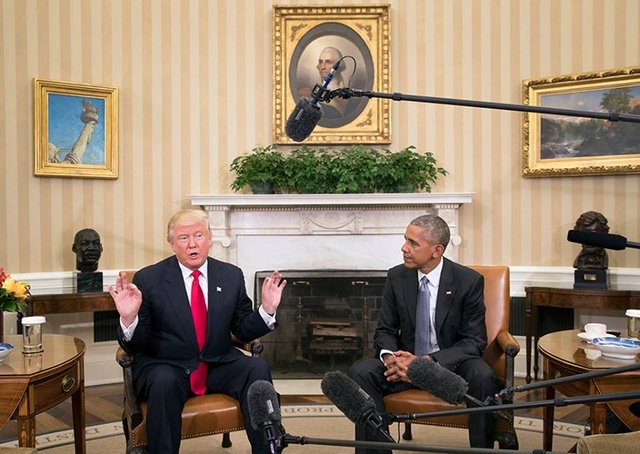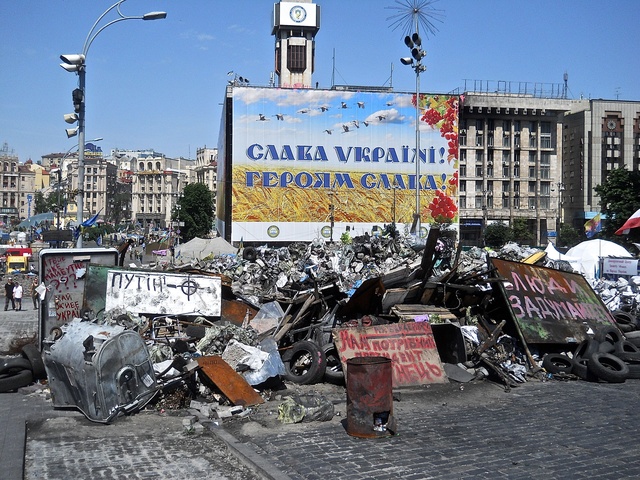Bruce Sterling: Notes on the 2016 US Election

It’s hard to write of momentous events in the hot, crispy, pan-fried moment in which events are momentous. But I know that the events of this week are just a part of stranger, larger things that are coming. During my lifetime there’s always been something sacrosanct about the American Presidency. Not anymore. Yes, it will still be the office of a chief executive with atomic bombs and a huge military and spy apparatus. But it’s no longer the lay Papacy for a unipolar superpower. Like other aspects of the digital landscape, the Presidency is just up for grabs.
This disorder has been gathering for years though. The Trump enterprise of 2016 is the political heir of the Clinton impeachment of 1999. It’s the twenty-first century’s digital-native child of that strange enterprise that a younger Hillary Clinton once famously called “the Vast Right-Wing Conspiracy.” This mediated commotion of the late 1990s was never a classical “conspiracy,” but it was a kind of primitive, larval WikiLeaks, dealing in the leaky media artifacts of that period: namely, Monica Lewinsky’s taped phone confessions about sex with the President. These artless brags by the President’s mistress were known to many before the troubles went public. Because, in the 1990s, it had suddenly become unprecedentedly easy to duplicate and spread that kind of data.
This freedom to spread covert smut emboldened the President’s opponents. One innovative act of daring led to another, and so the American republic squalidly tumbled into a failed coup d’état over oral sex practices. It was weird, but less weird than Donald Trump. It’s easy to see, in the Trump Campaign, continuity in American sexual politics. Trump is the right-wing rake who can brazen Bill Clinton’s problems; the Donald being so marinated in media squalor that he’s effectively bulletproof. But even the US evangelicals have given up on the character debate; they voted overwhelmingly for a groping Lothario whose third First Lady has appeared in the nude.
The sex was always only ever pretense however – sex scandals having evolved from prurient condemnation into clickbait. Rather, the real continuity in twenty-first-century culture is in those vaporous “vast conspiracies” of political actors busy trading data that they were never supposed to have obtained. Gossip, black rumors, subversions, insults, trolling, lies, deceits, cyberwar, rape allegations – even sabotage and leaks. These pollutants used to be filtered out of the public discourse by cautious media gatekeepers. Now they are weaponized.
This is the Pandora’s Box of twenty-first-century politics, these rumor politics of modern power players organized for disruption, wherein the lines of play are drawn far outside the twentieth century’s staid political parties and its Fourth Estate of journalism. And, since it helps campaigners to seize power fast and cheap, it’s bound to get more like this, rather than less. Silicon Valley would call this a disruptive hack, since it undercuts debates, ground games, TV ads, and other expensive, tedious campaign clutter. It’s not that it’s all entirely sinister; on the contrary, people really enjoy social media. They much prefer to get their news from grapevines of relatives, friends, and neighbors who think like they do. They even enjoy organizing to go troll the enemy’s commentary. But it destabilizes the stately process of democratic power struggle, in much the way that, say, digital finance disrupts heavy industry. Bursts of popular viral fever appear, but very little statecraft gets accomplished. Old institutions are corroded or abandoned, yet no new ones are built.
 Maidan Square, Kyiv, 2014. Photo: Bruce Sterling
Maidan Square, Kyiv, 2014. Photo: Bruce Sterling
These flimsy modern upheavals go by many names: “springs” or “color revolutions” or “movements.” They are fatally easy to assemble, and so there are too many to count. They almost never develop into organized political parties, and almost never have the aim of promulgating rational programs for legislative action. Most efforts quickly disappear and are promptly forgotten. Now one of them has seized the Presidency of the United States. It’s the same phenomenon over and over, just with different branding: the Arab Spring, Occupy, Gezi Park, Euromaidan, the Ukrainian Civil War, Brexit, and now Donald Trump – except the last two have garnered legislative power. These miasmas appear anywhere save for the managed democracy of Russia and inside the Great Chinese Firewall, which is why both those powers now concentrate on spreading mayhem outside their borders. And whenever they do, they’re always electronically rapid. This means that they are spontaneous and therefore rantingly demagogic, unprepared for power, and tend to be poorly thought-through. Their political results are generally awful.
Maybe one of them truly worked: the original Arab Spring revolt in Tunisia. Many others have had diffuse impact or served to damage civil society. The upheavals in Ukraine, Libya, Yemen, and especially Syria, have been lastingly disastrous.
But a Tahrir Square rally and a Facebook Revolution were good enough to topple Egypt, and this year, the street rallies and networks turned out to be just as effective for a populist takeover in Britain and the USA. In recent years, Germany has been one of the few places that can congratulate itself for being a bulwark of legitimate democracy. But for how long?
Bruce Sterling is a novelist and futurist.
